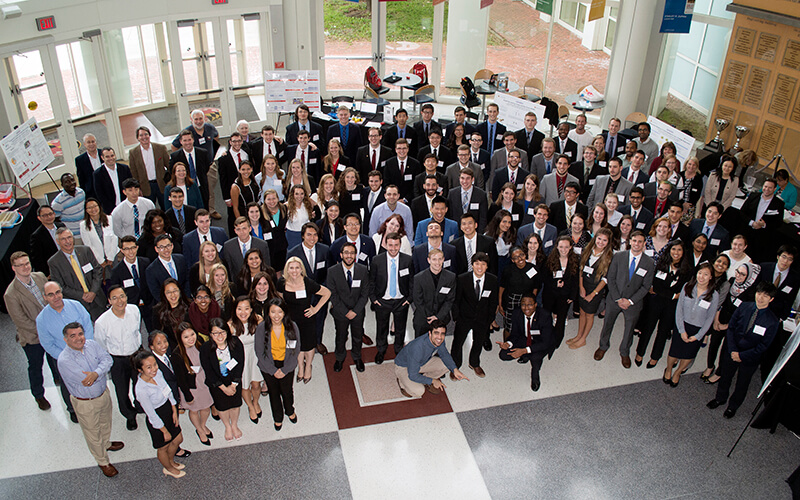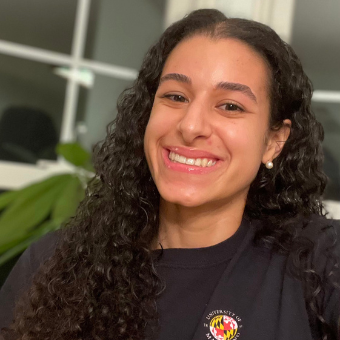Bioengineering is a field rooted in physics, mathematics, chemistry, biology, and the life sciences. Each of these areas is applied in a systematic, quantitative, and integrative way to approach problems important in biology, biosystems, medical research, and clinical practice. Bioengineering advances fundamental concepts, creates knowledge from the molecular to organ to system levels, and develops innovative processes for the prevention, diagnosis, and treatment of disease. In short, bioengineering seeks to improve the health and life of humankind on many levels.
Bioengineers specialize in those products and processes made from, used with, or applied to biological organisms. In addition to engineering science and design, bioengineers study cell biology, physiology, bioinformatics, bioimaging, and biomechanics. The synthesis of engineering and biology gives bioengineers unique capabilities in our modern world.
Bioengineering programs are often broad in scope, covering a variety of biological topics that are investigated with engineering principles. Biomedical engineering programs tend to emphasize topics related directly to human health, and thus may be seen as a subset of bioengineering.
You can learn more by watching what experts in the field told our students about designing and developing biomedical devices:
The undergraduate program is designed as a comprehensive, broad-based bioengineering education with opportunities to specialize. Moreover, our program emphasizes not only knowing how to apply engineering concepts to biological systems, but also developing a fundamental understanding of the biology. This knowledge is achieved through an immersion in biological science courses; foundation-building in math, physics, chemistry, and the engineering sciences; and the learned application of engineering principles to biomedical as well as general biological systems. The program culminates in the year-long senior Capstone Design course, which focuses on experiential learning as students collaborate with physicians and scientists to design engineering solutions to real-world clinical problems.
All Clark School undergraduate programs require students to complete a final project in what is known as a Capstone course. In Capstone, teams of students, under the guidance of faculty and mentors, utilize what they have learned throughout their undergraduate studies to create their own engineering designs from concept to product. The Fischell Department of Bioengineering receives support for its Capstone Design competition from the Fischell family, the
Mpowering the State initiative, and industrial sponsors
AgNovos;
Becton, Dickinson and Company; and
General Electric. Additionally, Capstone students often receive mentorship support from clinicians and/or industry representatives.
Examples of our seniors' Capstone research are available online.
On-Campus
All students in our major have the opportunity to participate in research in state-of-the-art bioengineering labs on campus, either within the department or through special programs. These include the Bioengineering Honors program, an intensive two year, thesis-based departmental research program; the HHMI Undergraduate Research Fellowship, a prestigious award that supports high quality basic science research; the ASPIRE Program, in which students collaborate with faculty and staff on technology-driven design and development projects; and the Maryland Center for Undergraduate Research, which assists students in finding research opportunities.
For examples of undergraduate bioengineering research on campus, see:
-
-
Rising senior Adam Berger was awarded a Barry M. Goldwater Scholarship and Excellence in Education Foundation. Berger is interested in creating novel lab-on-a-chip biosensors that enable point-of-care disease detection and diagnosis.
-
"Rappaport Wins HHMI Fellowship"
Senior Jeff Rappaport, won a 2012-2013 Howard Hughes Medical Institute (HHMI) undergraduate research fellowship to support his continued research on safe and effective targeted drug delivery systems.
-
-
If someone says they use a microscope in their research, most people would assume it's because they need to observe something very small. Senior Sara Johnson, a member of Joonil Seog's research group, used one grow and weave threads of silk-elastin-like peptide polymers (SELPs) into specific patterns and shapes.
Off-Campus
The Fischell Department of Bioengineering has also established relationships with biomedical research centers within the University System of Maryland and at surrounding government or industrial locations. Partner institutions and agencies includethe National Institutes of Health (NIH), the National Institute of Standards and Technology (NIST), the Food and Drug Administration (FDA), the Environmental Protection Agency (EPA), Children’s National Medical Center, and the University of Maryland Baltimore (UMB) Schools of Medicine, Dentistry, and Pharmacy. Our undergraduate students learn from regulatory experts through collaborative research with FDA scientists and engineers located only 5 miles from campus. Many federal laboratories (EPA, USDA, and NASA) are also nearby and offer internships for our students. Additionally, students have the opportunity to work in labs at UMB (Schools of Pharmacy, Dentistry, and Medicine)and gain exposure to clinical practice. Students can get involved through their professors' collaborations or through the Engineering Co-op and Career Services office.
Thanks to the breadth of our program, Maryland graduates are presented with a full range of career opportunities from those in medicine, human health, foods, government, dentistry, law, pharmaceuticals, biotechnology, ecological/bioenvironmental engineering, biomedical devices, bioprocessing, and teaching, just to name a few.
Our students also benefit from the
Clark School's Engineering Career Services, which gives students 24-hour access to engineering co-op, internship, summer, post-graduation, and part-time job listings. It also runs free resume clinics, career fairs, and other workshops for job seekers! Visit them online at
www.eng.umd.edu/careers to learn more.










